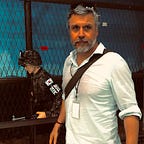Hong Kong not in the mood for love
In 2012 I speculated that the election of Leung Chun-Ying as chief executive on 25 March that year ‘went down as the day Beijing put another nail in the democratic aspirations of Hong Kong. Two years on, and in light of the current demonstrations in this city of 7.2 million people, it is very tempting to suggest that nail represented the end of democracy in Hong Kong.
Over the last 20 years, every time Hong Kong people have heard some ‘menacing’ messages from Beijing, they have responded and become politically active. This time, the menacing message was the one I heard two years ago in the office of Leung Kwok-hung — better known as ‘Long hair’ — in the Legislative Council or Legco — not far from the epicentre of the protests.
‘Beijing won’t honour its pledge that would allow Hong Kong to elect in 2017 its political leaders, including the Chief Executive,’ he told me then. And unfortunately, he was correct. China won’t allow the free and popular election in 2017 that Hong Kong people were hoping for. This disturbing message has sparked anger in this ‘gentle society’ — as described to me by veteran Hong Kong writer and journalist Nury Vittachi.
Leung Chun-Ying, who was sworn in in July 2012, is the third chief executive of Hong Kong since the handover to China in 1997. Under the Beijing sword of Damocles, a minuscule selection committee has elected all of them. Unwavering individuals loyal to the Communist Party. There is an old story that wonderfully illustrates Hong Kong’s chief executive allegiance to Beijing.
For most of his life, Donald Tsang — the predecessor of Leung — was famously a pro-democracy politician. He was also very pro-British, and when the Queen offered him a knighthood, Sir Donald was pleased. But soon, the ‘Sir’ quietly disappeared from his title. He wanted the top job in Hong Kong, and he needed Beijing’s blessing.
The nonconforming ‘Long hair’ — founder of the League of Social Democrats and a member of the Legislative Council representing the New Territories East — told me two years ago that ‘any leader who comes with the blessing of Beijing won’t ever serve the people of Hong Kong.’
Two years on, and Leung has catastrophically failed to serve the people of Hong Kong. He is not a leader but a technocrat who makes the subway trains run on time. But he can’t reflect and respond to the political aspirations of the people. And it is not only about their democratic demands, but their economic and social aspirations.
Unaffordable housing resulting from a housing shortage, the horrendous wealth gap, and the ferocious property appetite of Mainland Chinese over Hong Kong some of the other causes of the protests. Behind it, all is Beijing’s interference in Hong Kong affairs, including the evident erosion of the semi-democratic structure embodied by the ‘one country two systems.’
Despite his antics, Kwok-hung has had the political clarity to see Beijing’s so-called democratic road map for Hong Kong — free and direct election of the next chief executive in 2017 — all along as a massive cock-up. A cock-up that has put Hong Kong ‘on a collision course,’ as Nury Vittachi told me in a café at the bunker-looking Hong Kong Polytechnic University. That was two years ago, and his gloomy assessment — in light of the current events in Hong Kong — resonates louder than ever.
Despite the massive protests, not everyone is convinced they will last longer. While the shout for full democracy is loud and genuine, Hong Kong is — as Professor Anthony Cheung Bing Leung told me — a ‘practical and rational’ place. As soon as the financial district — the heart of the current unrest — starts counting losses, the most likely result is that the sympathy for this youthful and laudable uprising will start to disappear. In this context, it is possible to speculate that the so-called ‘umbrella revolution’ — one of the many catchy media-constructed identifiers of recent social uprisings — might slowly subside.
This is what Beijing is counting on. It has played down the whole affair. And while the Communist Party will keep on tightening its control over Hong Kong’s limited liberties, curbing freedom of speech and introducing school history books with the Tiananmen massacre chapter ripped out, it won’t send the tanks. Too much to lose — including face.
The 6000 strong People’s Liberation Army (PLA) presence in Hong Kong has been lying low for many years. And while seeing the garrison with the red flag waving used to send shivers up my spine, the PLA will keep lying low.
On the other hand — and to make matters more complex — Beijing can’t afford to ignore the fact that historically Hong Kong has been the cradle of some of the key events that have shaped China's modern history. These include Dr Sun Yat-sen’s revolutionary thoughts and plans for an uprising to oust the Qing Dynasty and to set up the Republic of China.
Also, it was Hong Kong’s underground Communist activists who helped forge the People’s Republic of China. The last thing China wants to see is Hong Kong give rise to a fully-fledged democracy within a one-party dictatorial system. Unthinkable.
Currently Director of Journalism at RMIT University Melbourne, Antonio Castillo taught at Hong Kong Baptist University 2010–12.Photos by Sam Wong, a Melbourne freelance photographer who has just completed an internship at Magnum Photos in New York. More at his blog.
Originally published at https://www.eurekastreet.com.au.
